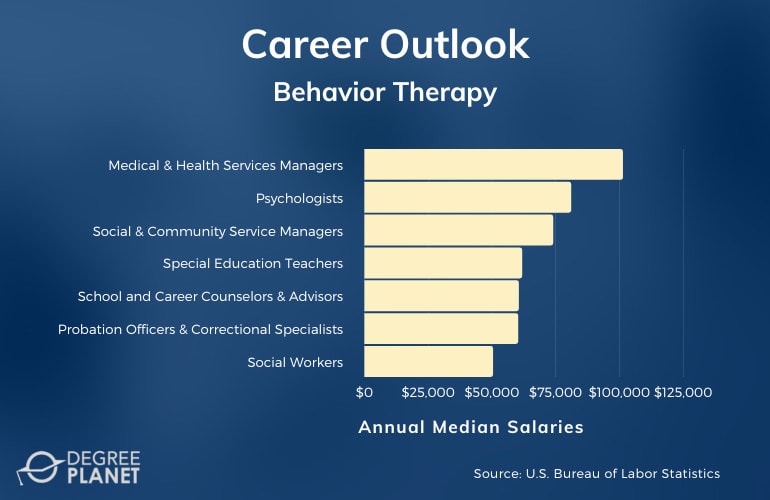If you have a strong desire to help other people overcome challenges, then you might be interested in how to become a behavioral therapist.

Although there are several different paths that can lead to a career as a behavioral specialist, each one involves earning college degrees and seeking licensure or certification.
Editorial Listing ShortCode:
As you explore the process of becoming a behavioral therapist, you might want to take the time to learn about not only the education process but also the many career opportunities in this field.
How to Become a Behavioral Therapist

The steps for how to be a behavioral therapist can vary somewhat depending on the type of therapy you choose to specialize in and the state where you want to practice.
Editorial Listing ShortCode:
Even still, the following steps can give you a general overview of what to expect by way of behavioral therapist requirements:
- Earn a bachelor’s degree. Undergraduate studies in a field like counseling, psychology, or social work could provide a strong foundation for your career development.
- Get a graduate degree. Most therapists need to have at least a master’s degree, and some have doctorates. Depending on your area of focus, you might study applied behavior analysis, psychology, occupational therapy, counseling, social work, or another field.
- Gain work experience. Counselors and therapists usually have to earn a set number of post-graduate hours of supervised professional experience before becoming licensed for independent practice.
- Apply for state licensure. The professional titles for licensed therapists vary from state to state, and so do the requirements. States typically require applicants to have passed an approved industry exam, such as the National Counselor Examination (NCE) or the Examination for Professional Practice in Psychology (EPPP).
- Pursue certifications. Certifications are offered by professional industry groups. They demonstrate your expertise in a specific branch of counseling or behavioral therapy. For example, you could become certified for applied behavior analysis or cognitive behavioral therapy. Depending on the certification and your professional path, you might become certified before or after achieving state licensure.
For more information on the requirements in your area, you can check with your state licensing board.
Common Types of Behavioral Therapy

Behavioral therapy is a term used to describe a variety of approaches to helping people change their behavior and, as a result, their lives. There are multiple schools of thought that fall under the category of behavioral therapy. You may want to study one or more of these:
- Applied Behavior Analysis Therapy. Often used for children with autism spectrum disorders, ABA reshapes a person’s behavior in gradual steps. Positive reinforcement encourages patients to choose desirable behaviors.
- Cognitive Behavioral Therapy. The idea behind CBT is that, by adjusting people’s thoughts, you can help them change the ways that they feel and act. Through therapy, people learn tools and techniques for overcoming negative patterns in their lives.
- Cognitive Behavioral Play Therapy. CBPT is a play-based form of CBT that’s intended especially for young children, typically between the ages of 2 and 8. In CBPT, the therapist may use toys to model appropriate behavior or have children act out scenarios with puppets.
- Dialectical Behavior Therapy. DBT emphasizes accepting and managing feelings through mindfulness and other techniques. This type of therapy is useful for people with personality disorders, depression, and post-traumatic stress disorder. It’s also helpful for patients for whom CBT alone may not suffice.
- Exposure Therapy. For people with specific fears or aversions, exposure therapy provides controlled exposures that can gradually help people become more comfortable with the things that frighten them.
The area of behavioral therapy you choose to specialize in may depend on the population you’d like to work with during your career.
3 Things You Can Do as a Behavioral Therapist
Training in behavioral therapy could help you pursue a variety of jobs in industries like healthcare, education, criminal justice, and social service. While your options will depend on your training and experience, three of the top behavioral health careers are listed below.
1. Behavior Disorder Therapist

When it comes to licensed behavioral therapist careers, providing counseling services in office settings is often one of the first things that comes to mind.
Behavioral therapists can provide individual or group therapies for kids or adults. Their patients could include people with autism, anxiety, depression, addictions, or other concerns. In addition to working in private practice offices, common employment settings for behavioral therapists include hospitals, community service agencies, group homes, or prisons.
2. School Psychologist

Students with special learning needs or behavioral disorders rely on the support of school psychologists. Studying behavioral therapy could enhance your career as a school psych and increase your ability to meet students’ needs.
Editorial Listing ShortCode:
In many states, becoming a school psychologist requires a master’s degree or post-graduate studies. Behavioral therapy certification could require additional coursework as well. School counseling is a related career that might also benefit from training in behavioral health.
3. Health Services Manager

Rather than being the person who works directly with patients to deliver therapies, some professionals work as managers and help run a mental health organization. You might be able to qualify for leadership positions after gaining experience as a behavioral therapist.
Managers may be responsible for staffing a behavioral health practice and organizing work schedules. Other responsibilities could include planning budgets, coordinating communication, and ensuring regulatory compliance. Some managers oversee patients’ treatment plans too.
Behavior Therapy Careers & Salaries

Training and certification in behavioral therapy can be useful for a variety of career paths. According to the Bureau of Labor Statistics, here are some of the potential careers that can benefit from behavior analysis studies.
| Careers | Annual Median Salaries |
| Medical and Health Services Managers | $101,340 |
| Psychologists | $81,040 |
| Social and Community Service Managers | $74,000 |
| Special Education Teachers | $61,820 |
| School and Career Counselors and Advisors | $60,510 |
| Probation Officers and Correctional Treatment Specialists | $60,250 |
| Social Workers | $50,390 |
| Substance Abuse, Behavioral Disorder, and Mental Health Counselors | $48,520 |
| Preschool and Childcare Center Directors | $47,310 |
| Rehabilitation Counselors | $38,560 |
Your employment options can vary greatly based on your level of education, your area of study, and your professional certifications and licenses. Job title, education, experience, and geographic region will also influence your personal earnings.
Behavioral Therapist Qualifications

Education is one of the most essential steps in becoming a behavioral therapist. Most therapists have masters degrees or higher.
During your college courses, you might take classes on mental health disorders, counseling practices, and behavioral science. You’ll also study assessment techniques and intervention strategies. Your courses can train you to lead both individual and group counseling sessions.
There are several degree paths that could prepare you for a career in behavioral therapy. For example, school psychologists, licensed clinical social workers, and applied behavior analysts may all use behavioral therapy strategies. Depending on what you’d like to do, you could study social work, mental health counseling, psychology, applied behavior analysis, or a related field.
For example, some professionals earn an on-campus or an online masters in applied behavior analysis and enter into a career in this specialty. Others may earn an online developmental psychology degree and go into that field.
Editorial Listing ShortCode:
After completing your degree, your state may require you to apply for licensure before working as a therapist. To qualify, you may need to earn supervised work experience hours and pass an exam. Your title will depend on your area of expertise and your state’s regulations.
Examples include licensed clinical social worker, licensed professional counselor, or applied behavior analyst. A growing number of universities offer online masters in social work programs as well as ones leading to an online masters in addiction counseling for busy working professionals.
It’s often necessary to pursue industry certification too. Professional credentials prove that you have prepared and trained to become an expert in behavioral health who can implement modeling, positive reinforcement, and other interventions. Common credentials include:
- Board Certified Behavior Analyst (BCBA)
- Certified Cognitive-Behavioral Group Facilitator (CBGF)
- Individual DBT Therapist
Some states require you to be a BCBA in order to call yourself a behavioral therapist. To learn more about the qualifications in your state, you can consult your state’s licensing board.
Behavioral Therapy Programs Accreditation

It’s essential to choose regionally accredited colleges for each step of your behavioral therapist education. At accredited schools, you can count on earning a high-quality education that can help you work toward your goals.
Other colleges and universities pay attention to accreditation status. If you need to switch schools, your credits are more likely to transfer if you earned them from somewhere that holds regional accreditation. When you apply for higher education programs, such as masters or doctoral degree studies, regional accreditation is essential.
Working in this field can require regional accreditation too. Licensing and certification boards typically require relevant studies from accredited colleges.
Is Financial Aid Available?

Yes, you may qualify for financial help as you study for a career in behavioral health. Government aid can come from state or federal sources. As an undergrad, you might qualify for both loans and grants. Graduate students are more likely to receive loans.
Scholarships and fellowships are private types of funding, and an application process is usually required. They might be offered by your college or other organizations. Some employers help their workers pay for college, too. To learn more about your financial aid eligibility, particularly when it comes to government funding, you can fill out the Free Application for Federal Student Aid (FAFSA).
What Is Behavioral Therapy?

Behavioral therapy is a field that focuses on helping people change their patterns of behavior and often their thoughts as well. It can be useful for a range of conditions or experiences.
Behavioral therapy techniques can be helpful for people with autism, anxiety, depression, substance abuse disorders, and more. This is a broad category that includes several sub-disciplines, including cognitive behavioral therapy and applied behavior analysis. Different styles use different techniques, but common ones include positive reinforcement, modeling, role-playing, and breathing exercises.
What Degree Do You Need to Be a Behavioral Therapist?

You have options when it comes to your education in behavioral therapy. In general, though, it’s necessary to have both a bachelors degree and a graduate degree.
For your undergraduate program, you could choose a field like psychology, social work, or counseling. After that, you could pursue a master’s in applied behavior analysis, counseling psychology, occupational therapy, or a similar field. You can also benefit from industry certifications that demonstrate your expertise in behavioral health.
Editorial Listing ShortCode:
Depending on the certification program you choose, such as Board Certified Behavior Analyst (BCBA), you may be required to take a particular series of relevant college courses.
What Does a Behavioral Therapist Do?

Behavioral therapists help people overcome challenges related to their mental health, socialization, education, or another area of life. Their patients often deal with conditions like generalized anxiety disorder, autism, trauma recovery, or depression.
Many therapists aim to adjust not only behavior patterns but also thought patterns. They teach patients to use tools like role-playing, journaling, and daily schedules to make positive changes in their thoughts and actions. With these techniques, therapists can help patients become more independent, increase their socialization, or adjust to their environment.
Where Do Behavioral Therapists Work?
Behavioral therapists work in a variety of settings. Many are in private practice and see patients in an office. Others are associated with schools, hospitals, correctional facilities, or social service organizations. Therapists can also work in long-term care facilities, such as special-needs homes or drug rehabilitation centers.
Therapists can hold a variety of job titles too. Some are known as behavioral therapists. Others work as corrections counselors, teachers, special education coordinators, rehabilitation counselors, addiction counselors, or clinical managers. Different educational paths can prepare people for different roles in behavioral health.
How Much Do Behavioral Therapists Make?

According to the Bureau of Labor Statistics, the median annual pay for substance abuse, behavioral disorder, and mental health counselors is $48,520.
Most make between $30,870 and $77,980 each year. The highest wages usually go to those who work for government agencies. The median salary for government counseling positions is $60,450. Psychologists have a median annual salary of $81,040, and salaries usually range from $47,850 to $133,890. The median wage for clinical, counseling and school psychologists is $79,510.
How Long Does It Take to Become a Behavioral Therapist?

It typically takes 6 to 8 years to become an independently practicing behavioral therapist. First, earning a bachelors degree usually takes around 4 years. Then, it’s necessary to get a graduate degree. Master’s programs may last just 1 year, but most are closer to 2 years, especially since internships are usually required.
Editorial Listing ShortCode:
Choosing to get a doctorate instead could take 4 or more years. Before you can become certified and licensed, it’s also necessary to earn supervised work hours. How many hours you need will depend on your specialty, but the process often takes 1 to 2 years.
Getting Your Behavioral Therapist Degree Online

Before you can get your behavior therapist certification, you’ll first pursue an education. This field requires several years of schooling, including a bachelor’s degree and a graduate degree.
You can take the necessary classes online. Whether you’re ready for undergraduate studies or a master’s degree, online studies could offer you the opportunity for a flexible, affordable education that works for your lifestyle.
After getting an education in behavioral therapy from an accredited school, you could be on your way to becoming a mental health therapist, an applied behavior analyst, or a substance abuse counselor. Why not start checking out accredited online programs today?

